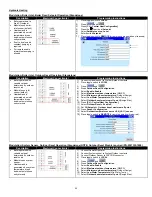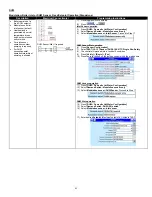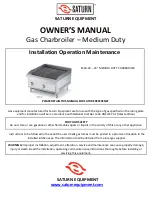
30
4.12
CIRCULATING PUMP SELECTION
The appliance has a stainless steel heat exchanger for fast response and high heat absorption. Selecting the proper pump will ensure
that temperature rise does not exceed the maximum recommended for the application.
4.12.1
CIRCULATING PUMP OPERATION OF HEAT EXCHANGER
MOST IMPORTANT
This appliance is designed for continuous pump operation when the burner is firing. The pump control option allows the appliance
circulating pump to be cycled “ON” prior to the burner firing and cycled “OFF” sometime after the set point is satisfied.
The operation of the circulating pump is controlled by the
Advantus
temperature control (SOLA). When the appliance is activated by a
remote operating signal the pump will start and run for the operating cycle and for a post purge period based on temperature difference
between inlet and outlet connections to the appliance. The SOLA can directly operate pumps up to 1/6 HP. Larger pumps will require
a separate relay or contactor.
To select the proper pump, it is strongly recommended to consider the following:
Need to know the required flow (GPM) and pressure drop for your appliance (see Table 8)
Type of application: hydronic heating or domestic hot water (DHW).
For hydronic heating and DHW applications with normal water hardness choose a pump which will result in a temperature rise
across the main heat exchanger of 20ºF to 40ºF (11.1ºC - 22.2ºC) depending on the size of the heater. If necessary, use a
flow setter valve to achieve the desired temperature rise.
For DHW applications with other than normal water hardness consult the factory for recommendations.
NOTE
The use of a system sensor is required in lead lag operation
1. When variable speed main circulators ARE NOT used the system sensor is to be placed into the return system piping.
2. When variable speed main circulators are used the system sensor is to be placed into the supply system piping.
4.13
∆T HEAT EXCHANGER ALGORITHM
The
Advantus
is constantly monitoring the inlet and outlet water temperatures. W
hen the ∆T approaches 60°F the burner will modulate
down to prevent tripping of the high limit.
Figure 22: Recommended Piping with Variable Primary/Secondary
Summary of Contents for ADVANTUS AVH 500
Page 2: ......
Page 3: ......
Page 38: ...31 Figure 23 Recommended Piping with Reverse Return and Variable Primary Flow...
Page 88: ...81 PART 12 EXPLODED VIEW Figure A...
Page 89: ...82 Figure B FAN BURNER ASSEMBLY AV500 600 some items may not be as shown...
Page 90: ...83 Figure C FAN BURNER ASSEMBLY AV800 4000 some items may not be as shown...
Page 91: ...84 Figure D Figure E...
Page 92: ...85 Figure F Figure G...
Page 93: ...86 Figure H CONTROL BOARD ASSEMBLY...
Page 100: ...93 PART 13 ELECTRICAL DIAGRAMS...
Page 101: ...94...
Page 102: ...95...
















































